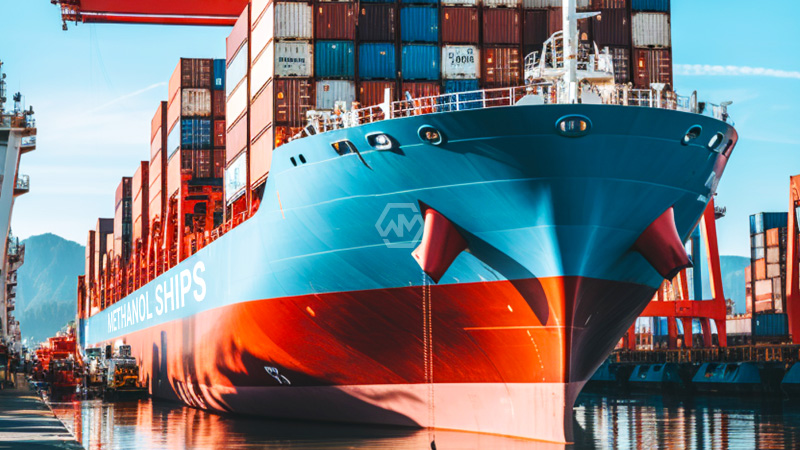- Mitsubishi Shipbuilding secures orders for Japan’s first methanol-fuelled RoRo cargo ships.
- Ships to feature dual-fuel engines, cutting CO2 emissions by over 10%.
- Enhanced vehicle loading capacity and fuel efficiency innovations included.
Mitsubishi Shipbuilding, part of the Mitsubishi Heavy Industries (MHI) Group, has received orders from Toyofuji Shipping and Fukuju Shipping for the construction of Japan’s first methanol-fuelled RoRo (Roll-on/Roll-off) cargo ships.
These vessels will be built at the Enoura Plant of MHI’s Shimonoseki Shipyard & Machinery Works in Yamaguchi Prefecture, with completion and delivery expected by the end of fiscal 2027.
Japan’s Coastal Shipping Goes Green with Methanol-Fuelled RoRo Ships
The new ships will utilize dual-fuel engines capable of running on both methanol and heavy fuel oil, which will significantly reduce CO2 emissions by over 10% compared to similar vessels powered only by fuel oil. They will also feature innovative design elements like a windscreen at the bow and a vertical stem to minimize propulsion resistance, as well as MHI’s proprietary energy-saving systems combining high-efficiency propellers and high-performance rudders. These advancements will not only improve fuel efficiency but also enhance the environmental sustainability of coastal shipping operations in Japan.
The innovative design of these ships includes a windscreen at the bow and a vertical stem to reduce propulsion resistance, alongside MHI’s proprietary energy-saving systems. These systems incorporate high-efficiency propellers and high-performance rudders to further decrease resistance and boost fuel efficiency. The dual-fuel engines, capable of operating on both methanol and heavy fuel oil, will lower CO2 emissions by over 10% compared to traditional fuel oil-powered ships.
In addition to their environmental benefits, the new RoRo ships will enhance operational efficiency with their increased vehicle loading and transport capacities. This will allow for more flexible ship allocation schedules, providing additional rest and holiday time for crew members and supporting better working conditions. The ships are also designed to be future-proof, with the potential to utilize green methanol, further reducing their carbon footprint across the entire fuel lifecycle.
This development is part of a broader trend within Mitsubishi Shipbuilding to innovate in the realm of sustainable maritime fuels. Recently, the company has been working on the Mitsubishi Ammonia Supply and Safety System (MAmmoSS) and has collaborated with WinGD on designing an ammonia fuel supply system for ammonia-powered engines. These initiatives underline Mitsubishi’s commitment to pioneering eco-friendly technologies in the shipping industry.
Mitsubishi Shipbuilding’s venture into methanol-fuelled RoRo ships signifies a pivotal shift towards greener, more efficient maritime transport in Japan, setting new standards for the industry.
“In the future, the use of green methanol may lead to further reduction in CO2 emissions, including throughout the lifecycle of the fuel, according to Mitsubishi Shipbuilding.”



